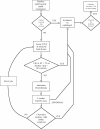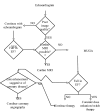Noninvasive diagnosis of chemotherapy related cardiotoxicity
- PMID: 22758624
- PMCID: PMC3322441
- DOI: 10.2174/157340311799960672
Noninvasive diagnosis of chemotherapy related cardiotoxicity
Abstract
Chemotherapeutic agents reduce mortality and can prevent morbidity in a wide range of malignancies. These agents are, however, associated with toxicities of their own, and the treating physician must remain ever vigilant against the risk outgrowing the benefit of therapy. Thus, pre-treatment evaluation and monitoring for toxicity during and following administration is a fundamental tenet of oncologic practice. Among the most insidious and deadly toxicities of antitumor agents is cardiac toxicity, which in some cases may be irreversible. Early detection of cardiotoxicity allows the treating oncologist to redirect therapy or dose modify, taking into account the cost of a reduction in therapy against the potential of further injury to the patient. In these instances, the role of the cardiologist is to assist and advise the oncologist by providing diagnostic and prognostic information regarding developing cardiotoxicity. This review discusses noninvasive diagnostic options to identify and characterize cardiotoxicity and their use in prognosis and guiding therapy. We also review established protocols for cardiac safety monitoring in the treatment of malignancy.
Figures




References
-
- Cardinale D, Colombo A, Sandri MT, et al. Prevention of high-dose chemotherapy-induced cardiotoxicity in high-risk patients by angiotensin-converting enzyme inhibition. Circulation. 2006;114(23):2474–81. - PubMed
-
- Bosch X, Esteve J, Sitges M, et al. Prevention of chemotherapy-induced left ventricular dysfunction with enalapril and carvedilol rationale and design of the OVERCOME trial. J Card Fail. 2011;17(8):643–8. - PubMed
-
- Seidman A, Hudis C, Pierri MK, et al. Cardiac Dysfunction in the Trastuzumab Clinical Trials Experience. Journal of Clinical Oncology. 2002;20(5):1215–21. - PubMed
-
- Shapira J, Gotfried M, Lishner M, et al. Reduced cardiotoxicity of doxorubicin by a 6-hour infusion regimen. A prospective randomized evaluation. Cancer. 1990;65(4):870–3. - PubMed
-
- Legha SS, Benjamin RS, Mackay B, et al. Reduction of doxorubicin cardiotoxicity by prolonged continuous intravenous infusion. Ann Intern Med. 1982; 96(2 ):133–9. - PubMed
Publication types
MeSH terms
Substances
LinkOut - more resources
Full Text Sources
Medical

